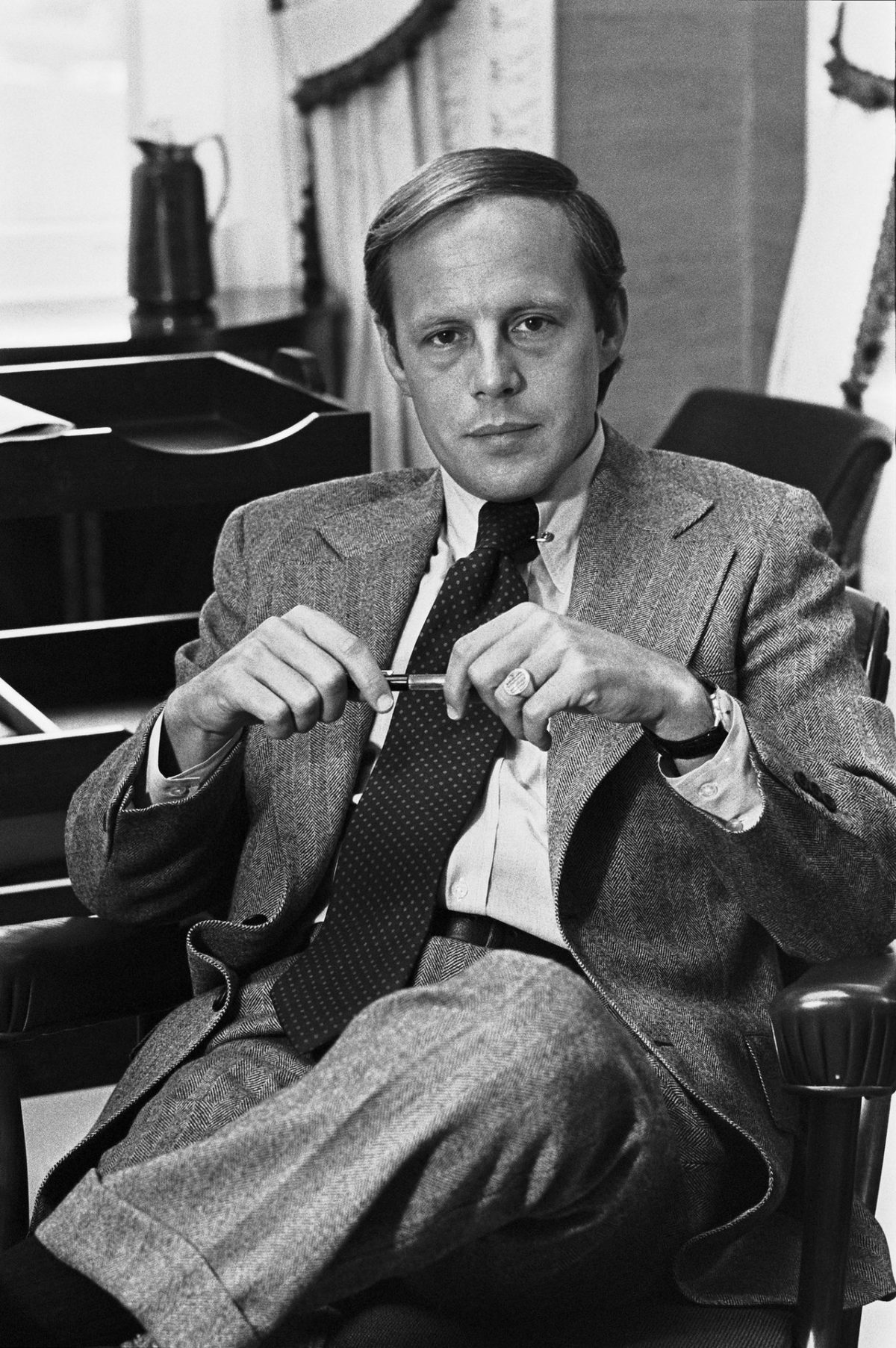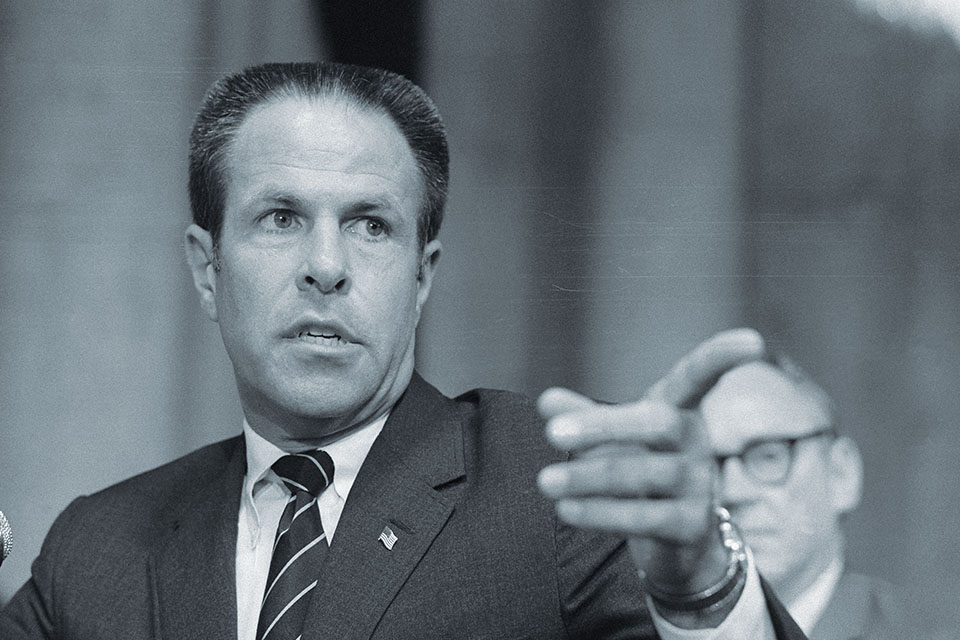What did president Nixon know and when did he know it?
Forty years ago, in the summer of 1973, a little-known 34-year-old White House counsel, John W. Dean, delivered riveting televised testimony before the Senate Watergate Committee. The committee was investigating the role of President Richard Nixon’s administration in a June 17, 1972, break-in at the Democratic National Committee headquarters at the Watergate complex in Washington, D.C. Dean’s revelations of the administration’s attempt to cover up its involvement led to Nixon’s resignation on August 4, 1974. Dean later pleaded guilty to obstruction of justice for his part in the scandal. Dean is working on his third book related to Watergate, scheduled to be released next year. In transcribing or re-transcribing 1,000 audiotapes, he has uncovered, he says, “news of a historical nature”: Nixon’s knowledge about a planned break-in to George McGovern’s presidential campaign headquarters in 1972.
Forty years after Watergate, what’s the big lesson about power and the presidency?
Today, unfortunately, the lesson of Watergate is don’t get caught if you abuse power, and if you cannot hide your abuses, as several Nixon successors have shown, simply tell the world you are using your power for the good of America, and act like you mean it. That will sound cynical, but it is the sad truth. For several decades, the shadow of Watergate did have a restraining influence on abuses of government power and misuses of the American presidency. But as the memory of Watergate began to fade, so did the lessons. In fact, there has been a successful effort to take the presidency back to its pre-Watergate status.
GET HISTORY’S GREATEST TALES—RIGHT IN YOUR INBOX
Subscribe to our HistoryNet Now! newsletter for the best of the past, delivered every Monday and Thursday.
Why was Nixon so obsessed with secrets and enemies?
Richard Nixon began his presidency hoping to make it highly transparent. Indeed, his first instructions on “executive privilege” reflect such a desire. Nixon, like his immediate predecessor Lyndon Johnson, was besieged by serious national security leaks during the Vietnam War, which he felt limited his options to govern. As the leaks increased, so did his efforts to keep secrets. As for his desire to do in his enemies, both perceived and real, it was worse than I thought. I am currently listening to all of his conversations relating to Watergate, and it is striking that the more assured he became of his 1972 reelection, the more he was determined to get back at his enemies. Why he was this way is a matter for psychologists and psychiatrists.
When did you first become aware of the legal gravity of the Watergate cover-up?
I was not aware that I was on the wrong side of the law until after the election. I should have been aware immediately, but conspiracy to obstruct justice is not a brightline crime. After the June 17 arrests of the burglars at the Watergate, I suggested to John Ehrlichman, who had been White House counsel before me, that we bring a criminal lawyer on the staff because we did not have that experience. He rejected the suggestion. That was a mistake.
It was not until [special counsel] Chuck Colson gave me a recording of his conversation with Howard Hunt [one of those involved in the Watergate break-in and wiretapping] that I realized we were obstructing justice. Hunt, in essence, told Colson that if he and the others were not taken care of, we would have problems. By that time I had learned that Hunt, Gordon Liddy and two of the men arrested at the Watergate had all been involved in a [1971] break-in related to Daniel Ellsberg, who leaked the Pentagon Papers. Ehrlichman had approved it. After listening to the Hunt-Colson conversation I realized we were obstructing justice. When I told Ehrlichman he rejected the notion, claiming we had no criminal intent. He later tried that defense when he was indicted, unsuccessfully.
Recommended for you
Why did you decide to confront Nixon with the “cancer on the presidency” meeting in March 1973 — and what was his reaction?
I had a somewhat perfunctory meeting with the president on September 15, 1972, the day the indictments were handed down against the five Watergate burglars, plus Howard Hunt and Gordon Liddy. By March 21, 1973, I was meeting with the president regularly and there was a confluence of events. First, I was not sure, based on our conversations, if Nixon fully understood the facts and their implication. The second situation, which triggered my action, occurred when Hunt sent a message directly to me—something he had not previously done—stating that if he was not paid $120,000 immediately he would have seamy things to say about Ehrlichman, referring to the Ellsberg break-in. Hunt was directly blackmailing the White House. Ehrlichman passed it off as a problem for others to handle. I told White House chief of staff Bob Haldeman that I thought I should lay out my concerns for the president, and he agreed. I wanted the president to know paying Hunt was obstruction of justice. To make sure I had his full attention, I told him there was a cancer on the presidency, and laid out the worst-case situation for him—all of which later occurred as I warned. To my amazement, the president thought the money should be paid until we could figure out what to do. I was surprised and disappointed by his response.
When H.R. Haldeman refuted your testimony about Nixon knowing of the cover-up, before the Oval Office tapes were revealed, what did you think?
To this day I remain stunned at the blatant perjury of Haldeman, as well as John Ehrlichman and [Attorney General] John Mitchell. Apparently, they thought it their only option. I was not personally concerned about their lies because I knew I was telling the truth, and probably naively, I believed that the truth has its way of surfacing. And it did.
Did you know about the Oval Office recording system before the tapes were revealed in the Senate hearings?
Other than Nixon and Haldeman, and Haldeman’s aides Larry Higby and Alex Butterfield, along with a few Secret Service technical experts involved in installing and maintaining the system, no one knew of its existence. Yet, because of Nixon’s odd behavior during our conversation on April 15, 1973, I thought I had been recorded, so I decided to include this fact in my testimony. A minority member of the Watergate Committee staff asked Butterfield on July 13 if I knew what I was talking about. Butterfield had not planned to volunteer the information, but he responded honestly. On July 16, Butterfield appeared before the full committee on national television and told the world that Nixon had recorded all his conversations in the Oval Office, his Executive Office Building office, his study at Camp David, and telephones at all these locations plus the Lincoln Sitting Room in the residence. It was the game changer.
Did Nixon authorize the Watergate break-in?
I am not exactly a Nixon defender or apologist, but I am aware of no evidence that Nixon or anyone at the Nixon White House knew Liddy was going to break-in and bug the Democratic headquarters.
But think about this fact, which I uncovered while doing research for my work-in-progress: If Liddy’s team had not been arrested at the Watergate but instead had gone on to do the other job planned for the night of June 17, 1972, which was to bug [Democratic presidential candidate] George McGovern’s campaign headquarters on Capitol Hill, and been arrested at that target, that undertaking would have been traceable directly from Nixon to Haldeman to [Haldeman aide] Gordon Strachan to Liddy. Nixon’s tapes reveal that in April 1972, he and Haldeman discussed the McGovern operation, and a few days later, according to Strachan’s contemporaneous handwritten notes, he was instructed by Haldeman to tell Liddy to transfer his intelligence-gathering capacity to Senator McGovern. I should note, however, that it is not clear from this conversation that Nixon was calling for the plant of an electronic listening device.
What reforms were instituted after Watergate — and have they stuck?
There were a number of significant reforms, among them campaign finance, investigative journalism, the operations of Congress vis-à-vis the president and a post-Watergate morality that included new ethics rules for lawyers. With the exception of ethics for lawyers, all the post-Watergate reforms have come and gone. The U.S. Supreme Court has dramatically restricted the power of Congress to control campaign finance. The Internet and increased corporate ownership of the news media has made investigative journalism the exception rather than the norm. Political polarization and successful efforts to empower the president have shifted the balance of power in Washington, making the president dominant again.
Because of my testimony—I had called attention to the number of lawyers who had gotten on the wrong side of the law—the American Bar Association developed a new code of ethics for lawyers. Those rules of professional conduct are very much still in effect.
Was Watergate our worst political scandal?
As scholars who’ve studied the subject report, scandals occupy a sort of middle ground of impropriety. Ben Bradlee, the Pulitzer Prize– winning editor of the Washington Post during Watergate, told me he thought the Iran-Contra scandal was far worse.
Watergate was high Washington politics. Richard Nixon was not about to become an American dictator or undertake a coup, nor was he some Mafia-like godfather running a criminal enterprise, as some of his detractors claim. Nixon did nothing as president that had not been done before and, remarkably, has not been done since. He got caught, and it is probably good that he did because he was hell-bent on going after his enemies in his second term, and he was not playing by Queensbury Rules. When the tapes revealed the real Richard Nixon, no one thought he should be president of the United States. His most selfless decision as president was to resign.
historynet magazines
Our 9 best-selling history titles feature in-depth storytelling and iconic imagery to engage and inform on the people, the wars, and the events that shaped America and the world.








